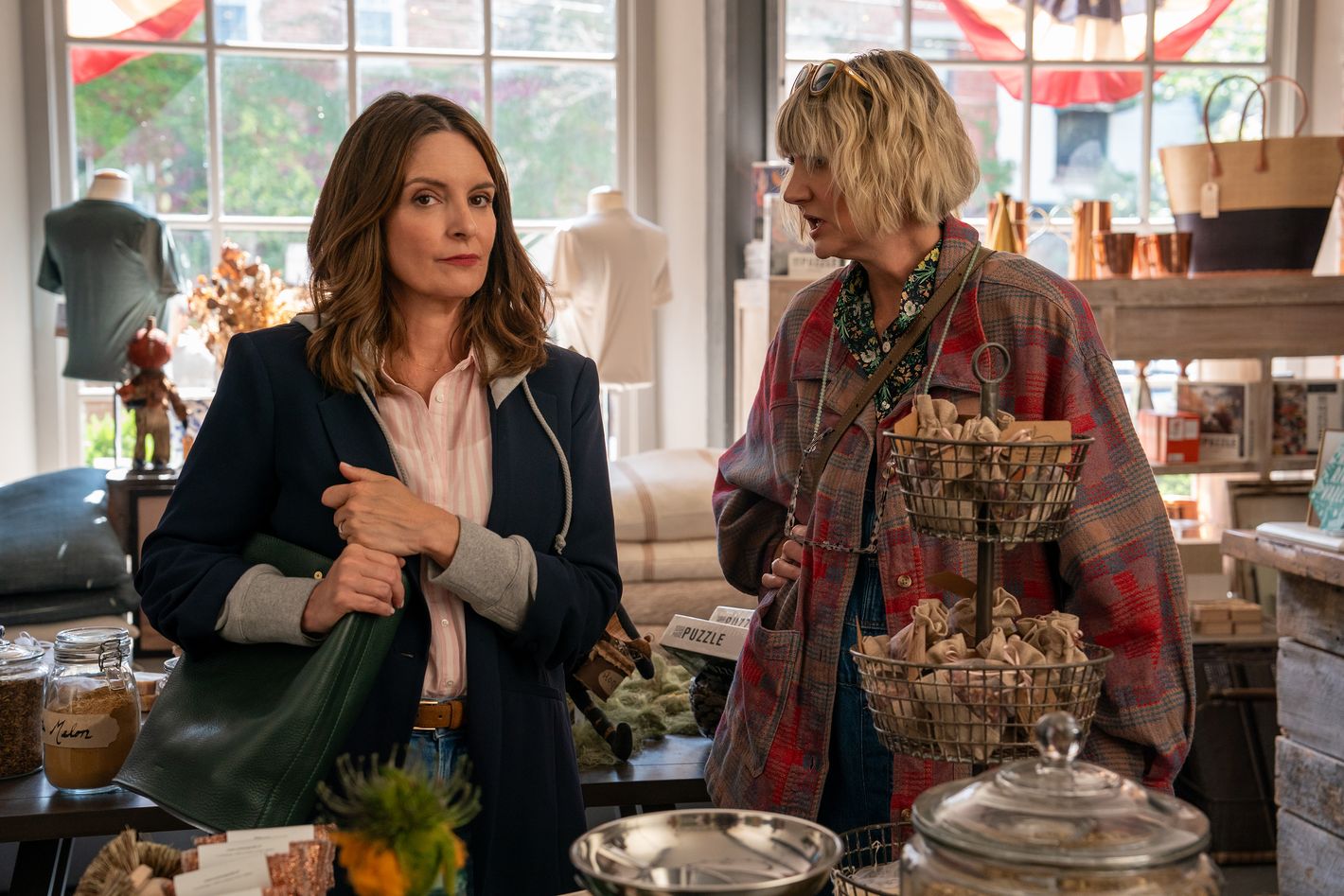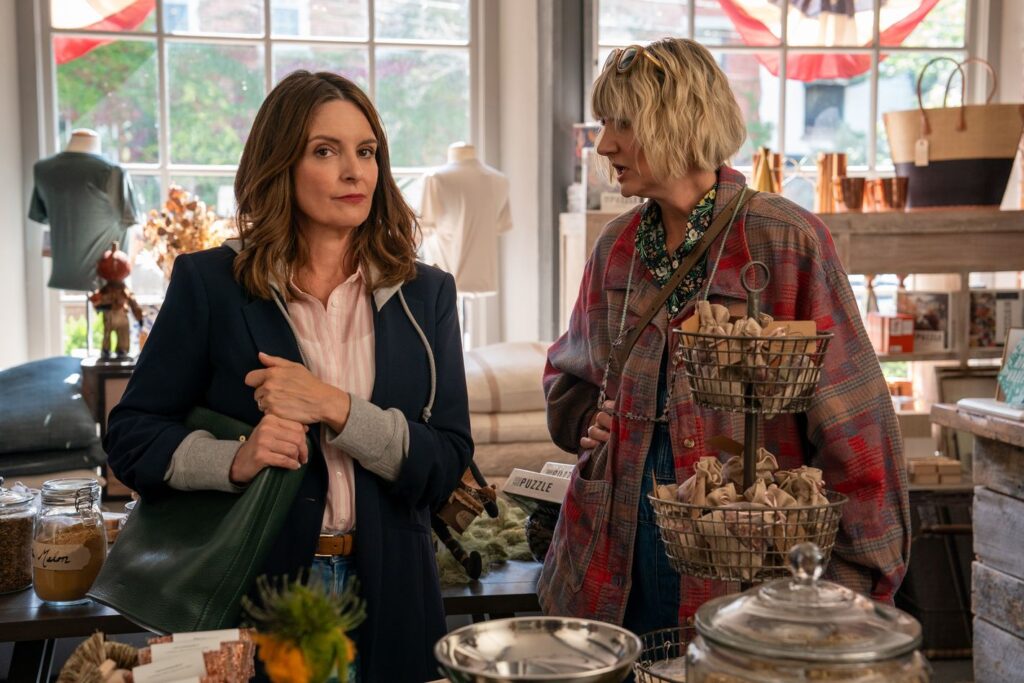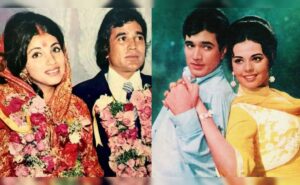
The Netflix comedy The Four Seasons stars (mostly) actors who are in their 50s, playing characters who are in their 50s, in a show whose target demographic is (I assume) people in their 50s. Perhaps that explains why this series’s greatest strength is its deep understanding of how it feels to be a person — admittedly with some privilege and a generous serving of self-absorption — in the deepest throes of midlife, staring down a future filled with empty nests, potential health issues, and the nagging fear that all chances for happiness are way past their expiration dates.
The age-specificity of this adaptation of the 1981 Alan Alda movie, also called The Four Seasons, may limit its wide appeal, as could some conspicuous flaws, especially the mismatched energy within the only principal gay couple, played by the always dialed-in Colman Domingo and a cloying Marco Calvani. But co-creators Tina Fey, Lang Fisher, and Tracey Wigfield, joined by several of their fellow former 30 Rock writers, put their established flair for deconstructing generational issues to effective use in their quest to showcase all the enraging absurdity of middle-aged monogamy.
The passage of time and the personal growth (or lack thereof) that accompanies it are baked into the comedy’s story structure, which, like the movie’s, follows three couples on four vacations over the course of a year. (I know: Who has time for this many vacations?) The first two episodes take place in the spring as Kate (Fey) and Jack (Will Forte) join fellow married couple Danny (Domingo) and Claude (Calvani) to visit their longtime friends Nick (Steve Carell) and Anne (Kerry Kenney-Silver) at their lake house. The occasion: Nick and Anne are celebrating their 25th wedding anniversary. But it’s not as much of a celebration as it initially seems.
Privately, Nick tells Danny and Jack that he’s planning to end his marriage, which has become boring and loveless. When Jack suggests that it’s normal for longtime married couples to sometimes feel like roommates, Nick says things are even worse than that: “We’re like co-workers at a nuclear facility. We sit in the same room all night, monitoring different screens.” Some of the dialogue in The Four Seasons is so mercilessly spot-on that it might make you laugh, then immediately schedule an appointment for couples therapy.
The targets the series hits most consistently are jokes that in some way involve aging, whether the literal aches and pains of it or the cognitive dissonance of feeling young even though society keeps reminding you that you definitely are not. After Jack hurts his hip playing Ultimate Frisbee, he complains to his wife about the struggles he endured while walking down a hallway to get some ice for his injury. “I can’t wait to see the 30 for 30 they make about this,” Kate responds with a level of sarcasm one can muster only after listening to the same man complain for decades.
This doesn’t technically count as a spoiler since it also happens in the 44-year-old movie, but you’re alerted nonetheless: Nick eventually starts dating a younger woman, Ginny (Erika Henningsen), who finds the barrier around Nick’s friend group pretty impenetrable. Meanwhile, Nick’s friends are flummoxed. When Kate tells Jack that she thinks Nick has turned into a Zelig, he deadpans, “Why don’t you explain what a Zelig is to Ginny and how it’s from a Woody Allen movie that you like?” The lack of pop-cultural overlap between generations is a running theme that also surfaces when Nick is trying to fit in with Ginny’s friends. In one episode, he tells a story that involves Kenny Loggins, then spends several minutes trying to explain to Ginny’s 30-something squad who Kenny Loggins is. (He built the highway to the danger zone, kids, show some respect.)
The Nick-Ginny relationship is the most fascinating and rich aspect of The Four Seasons because it raises uncomfortable questions for the whole group about their own marriages and the often delicate difference between chasing your bliss and being selfish. The main characters in this series tend to be judgmental of one another and, sometimes, the wider world in general. When Nick asks Danny if Kate and Jack are “being shitty” during their vacation at an ecoresort, Danny confirms that of course they are. “You know those two,” he says. “Complaining is their version of having sex.”
But I don’t think The Four Seasons necessarily wants us to find its characters nice or even completely likable all the time. It’s more interested in depicting the insularity that creeps into friend groups, for better and worse, and the thin line between comfort and complacency in any long-term relationship. The show is also honest about the fact that in middle age, a lot of people do become more set in their ways and afraid of change. That’s not a good thing, but it is a real thing.
It’s unfortunate that The Four Seasons can’t keep things a little more real more consistently. There are some plot contrivances that don’t work. Also, Claude dotes on Danny to such an extreme that even I, a person who does not live inside this TV show, actually yelled, “Geez, back off!” out loud at one point.
Perhaps the most regrettable misstep is the finale, which takes the series in a wildly different tonal direction and slides in a couple of last-minute twists, including one blatantly designed to set up a potential second season. But there are enough moments that will resonate with the Gen-Xers in the target demo to keep them clicking through to the next episode.
If you’re in your 30s or 20s or younger, The Four Seasons probably won’t be your jam. That’s okay. Even though this Netflix Original is technically for adults of any age, it’s not really for you. It’s made for people of a certain age who have been in committed relationships — marriages as well as friendships — that have miraculously stayed in place during multiple presidential administrations. It’s about wondering if there’s still something more in life that you’re missing, while learning to be grateful for the long, complicated relationships you already have.
More TV Reviews
Unless you’re middle-aged. Then it’s very much your thing.

































































